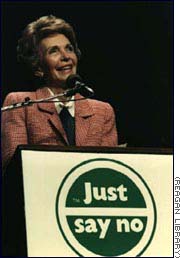
This explains everything. A blogpost Bob Burnett theorizes that Bush’s failures in Iraq, Afghanistan and the war on terror spring directly from the neo-con, fundamentalist theories about the 60s upheavals and cultural changes (sexual revolution, feminism, abortion, welfare, Vietnam protests).
Many Americans wonder why the White House promotes just say no programs when they don’t work. The answer is simple and disturbing: George Bush is a dogmatic ultra-conservative; he believes that the maxim, “just say no,” solves a variety of social problems ranging from pre-marital sex to terrorism.
Beginning in the Reagan Administration, conservatives attacked a so-called “culture of permissiveness” they claimed had been unleashed by the social events of the sixties. They accused liberals of espousing sixties values: “if it feels good, do it.” Conservatives declared that a mythical liberal attack on traditional values produced many of America’s problems such as poverty, promiscuity, and drug use. In 1993, conservative scholar Myron Magnet produced the seminal expression of this philosophy, The Dream and the Nightmare: The Sixties Legacy to the Underclass. Magnet argued that liberal ideology promoted a culture of victimization that held “the poor back from advancement by robbing them of responsibility for their fate and thus further squelching their initiative and energy.” The Dream and the Nightmare influenced many conservatives: among them a Texas gubernatorial candidate and his campaign manager. George W. Bush , “told the Wall Street Journal that it was the most important book he’d ever read after the Bible. [Furthermore] Bush strategist Karl Rove call[ed] The Dream and the Nightmare a roadmap to the president’s ‘compassionate conservatism.’”
The Bush-Rove brand of ultra-conservatism–their belief that liberalism has fostered a culture of victimization–strongly influenced this Administration’s domestic and foreign policy. Combined with the naive belief that the free market will inevitably solve most social problems, Bush’s conservatism produced a potpourri of aberrant social policies: Don’t give poor children free lunches or special tutoring because that will enhance their sense of being victims. Don’t teach teenagers about birth control because that will cause them to become promiscuous. Don’t provide clean needles for drug users because that will legitimize their behavior. And so forth.
In response to every American social problem, the Bush Administration relied upon a simple maxim: individual behavior equates to individual responsibility. Therefore, they argued that Government programs are unnecessary because behavior change requires only willpower; all an individual needs to do is to just say no and pull themselves up by the bootstraps. The free market provides unlimited opportunity for those who choose to take advantage of it.
Internationally, Bush’s “Just say no” response to terrorism mirrors his domestic policy on sex-education. He views the decision to join with terrorists, or to engage in pre-marital sex, in simplistic moral terms: a contest between good and evil; a choice that an individual makes regardless of the social context. This seems bizarre unless one understands that in Bush conservatism there is no social context except for the marketplace that, in the President’s mind, always rewards heroic individual action.
George W. Bush is a true believer. Only he’s not a devotee of mainstream Christianity, but rather of an ultra-conservative social philosophy that believes the best form of sex education is simply not to talk about it, to chant, “just say no” and hope for the best. An extreme ideology that believes the best way to eradicate terrorism is to kill everyone who might be a terrorist and, in the process, ignore the root causes of their violent extremism; to respond to the anger on the Arab street with a simple mantra: “just say no.”
No comments:
Post a Comment